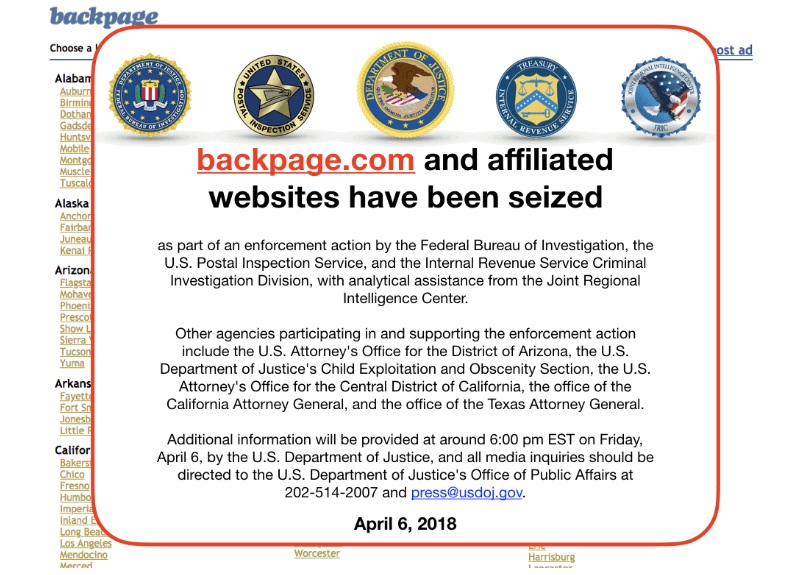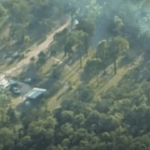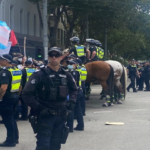Censorship Laws Put Sex Workers in Danger

Last week, US President Donald Trump signed off on two new laws which threaten to profoundly change the way we think about internet freedom, and sex workers are feeling the brunt of it.
SESTA/FOSTA, or the Stop Enabling Sex-Trafficking Act and Fight Online Sex Trafficking Act, became law on April 11. The dual legislation gives US authorities the power to level criminal penalties against internet platforms that host sex trafficking material.
While this might sound like a good thing, the legislation has been criticised by sex worker organisations, who assert it doesn’t do enough to differentiate between legitimate sex work, and sex trafficking.
In the days following the enactment of the laws, several major platforms used by sex workers were taken offline, including personals sites Backpage.com and Craigslist, and several sex worker communities on Reddit, effectively blocking their ability to advertise their services and screen clients. Other platforms, such as Google and Twitter, have also started banning the accounts of Sydney prostitutes.
“If you remove sex workers from the internet, you’re increasing sex trafficking because the internet provides a safe place for sex workers to find their clients. If you don’t have that place, the most marginalised escort sex workers are far more likely to turn to pimps who will exploit and take advantage of them,” one worker recently told News.com.au.
Importantly, the action against these sites has shown how vulnerable the internet commons, sites we all use that are based in the US, are to legal processes outside of our control. That a website used legally to facilitate prostitution in Australia could be taken offline because of a law passed in America should be a wake-up call to us all.
Sydney Criminal Lawyers® recently spoke to Jules Kim, CEO of sex worker advocacy group Scarlet Alliance, about the impact SESTA/FOSTA is having in Australia.
Sex workers have said that online platforms SESTA/FOSTA effects have made them safer, with some saying they’ve even saved their lives – why is this?
Everyone has different ways of working, but in terms of our work and our safety online platforms are definitely a mechanism that we use.
For example, there are tools that we have in terms of sharing information with each other about bad clients, there are sex worker only groups and websites that mean we can share that information amongst a large number of sex workers in real time.
It’s also a way sex workers can screen clients, it’s a way of negotiation not just for safety but also for negotiation of our services. Obviously every sex worker provides a different type of service, and has different boundaries, and of course each client is looking for different services. So a lot of that negotiation and screening happens online as well.
I suppose the flipside of that would be that their disappearance makes people less safe, is that the case?
Any tools of our work that you take away obviously reduces our options, and is problematic.
For example, those online resources that we use enables a much broader, timely reach, whether it be for sharing information about problematic clients or criminals that might be targeting sex workers, or just sharing information about issues relevant to sex workers.
For sex work organisations, doing outreach services to every sex worker obviously can’t happen every day, so connecting to people through those online mediums is a critical part of their services.
Do you think SESTA/FOSTA is going to affect the ability of organisations like Scarlet Alliance and SWOP to operate?
It’s a potential. At this stage we don’t know what impact it’s going to have. But there are sex worker organisations in the US that are raising awareness of how it may impact on their operations.
Obviously the ways in which it’s going to screen content, won’t differentiate between what might be a sex workers advertisement, a sex worker organisation’s advertising, and the very small amount of sex work trafficking posts they say they are setting up to fight.
Although that’s the stated purpose of the legislation, it’s not actually the function of the legislation, because there is already legislation that exists to combat trafficking. The recent seizure and prosecution of Backpage despite SESTA/FOSTA not yet being passed into legislation makes it evident that this additional legislation is not needed. So really, the only impact that it’s going to have, beyond the existing legislation, is in reducing avenues for sex workers to advertise, and reducing those tools that we have to manage our safety and our work.
A few years ago, MasterCard banned payments from Sydney prostitutes on Backpage.com, for reasons similar to those stated for SESTA-FOSTA. What were the effects then?
The rationale that MasterCard gave at the time was because it “has rules that prohibit our cards from being used for illegal or brand-damaging activities”.
As you know sex work per se is not illegal in most parts of Australia, but it was a blatantly discriminatory decision that impacted on sex workers in Australia regardless of legal frameworks.
The decriminalisation of sex work in NSW has been supported by a growing number of international organisations, do you expect these laws will have a windback effect on any of the gains made here?
Sex work in New South Wales is decriminalised, and decriminalisation is understood to be the best practice model for sex industry regulation.
That has been the case advocated by sex workers for many years now, and has been supported by a growing body of evidence, and a number of international organisations have stepped up to support full decriminalisation of sex work.
In recent years, Amnesty International have supported decriminalisation as the best model for protecting human rights for sex workers; the World Health Organisation and United Nations has said it is the best model in terms of public health outcomes, not just for sex workers, for the broader community as well; and also organisations like International Labour Organisation have said decriminalisation is the best model in terms of labour outcomes and industrial rights for sex workers. So there is evidence in support of decriminalisation as best practice from every perspective.
In Australia, we have a very complex matrix of laws that regulate the sex industry, so we sometimes have Federal legislation that conflicts with State based legislation, and different types of legislation in different states and territories that impacts different areas of sex work, such a street and brothel based work, so there’s many different laws that govern the sex industry.
There’s this kind of rationale of needing to have increased legislation to protect against trafficking in the sex industry, but it doesn’t make sense, the measures that are proposed don’t have that impact. Sadly we still don’t have a compensation scheme for people who have been trafficked but instead laws keep being proposed that do not support trafficked people but impact negatively on sex workers.
In terms of criminalising trafficking, or detecting trafficking, it will have adverse effects in terms of driving sex work further underground.
Sex work is very different from other industries, because we do have to advertise, and because we do interact with clients, whereas someone farm or a factory wouldn’t necessarily have that external contact. Sex worker organisations also routinely have contact with sex workers in their workplaces through outreach.
In Australia, there have only been a very small number of cases of trafficking in the sex industry and it is the case that a number of the trafficking cases that involved the sex industry were identified because of the advertising, or because of clients reached out to the police or through sex worker organisations.
I think by shutting down these kind of online tools it isn’t going to stop the sex industry, but it it will drive sex workers further underground, and reduce our choices and our options.
From a civil liberties perspective, what do you think it says more generally about the ‘free internet’ when a piece of legislation in America can impact people like this on the other side of the world?
Since this has happened, it’s come to our attention just how much online spaces are actually owned by the US, and its had an impact on the tools that we can use, not just in Australia but worldwide.
Backpage closed at 6pm on Friday night [6 April 2018], just before the weekend, and so all of a sudden sex workers advertisements for their services, their means of survival, were taken offline.

Image credit: http://backpage.com/
It is like if you went to turn up to work on the weekend, and all the sudden your workplace is gone. It took the means of making a living away without notice, at a time on the weekend where people seeking to complain or find out what was happening couldn’t, and for a lot of sex workers their means of earning a living were unexpectedly ripped out from underneath them.
It’s also already had an impact here, when Backpage shut down, Cracker [another site for sex work advertising] shut down as well, even through it’s owned by Fairfax.
This comes back to a bigger issue of powerlessness that we all face, given we all rely on these digital platforms based out of America – what can people do in Australia to support sex worker rights, and also protect the free internet more generally?
We are having to become more aware of where our information is stored, who owns that information, and who has rights to that information. There are sites, email and online communication providers that people can use that aren’t US-hosted, and certainly we are seeing people shifting to those spaces.
In terms of supporting sex worker rights, listen to sex workers. If the vast majority of sex workers are saying they don’t want a certain piece of legislation and that it is harmful for us, such as with FOSTA/SESTA, there’s probably a good reason for it. For sex workers, there can be a tendency to deny our agency and for non sex workers to think they are supporting legislation for our own good or to protect us, even in the face of overwhelming sex worker voices opposing it.
Sex workers are the experts in our own lives and know what is best for our health, rights and safety.
Did you have any other messages for our readers?
Look, obviously we’re all opposed to trafficking, and we’re all opposed to exploitation in the sex industry, and so on the surface people who aren’t involved in sex work might see this legislation as a good thing. They might think that it will stop trafficking, because that’s the stated purpose of the legislation, but the impact is quite different.
It doesn’t support victims of trafficking but it does impact negatively on a large number of people in what is a legitimate occupation. The best way to support all sex workers, including those who may be experiencing trafficking or exploitation, is to support the full decriminalisation of sex work. Sex workers want it and the evidence supports it.






